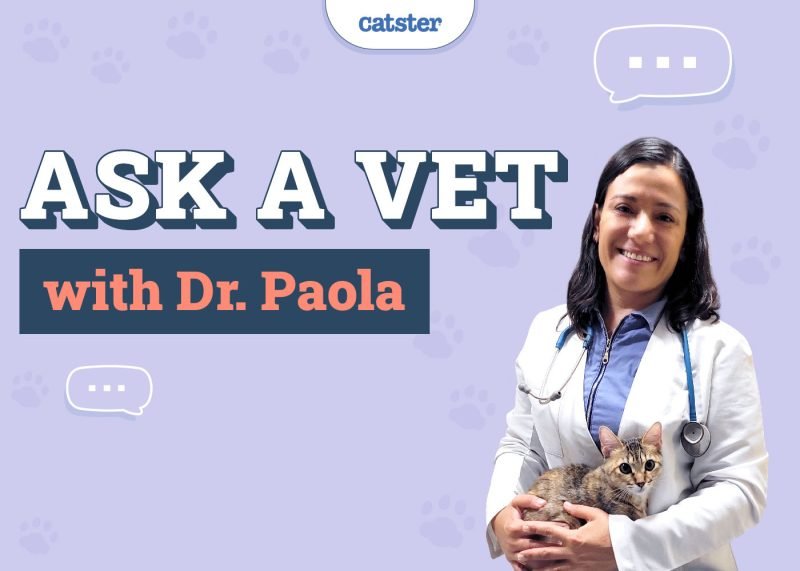Welcome to our “Ask Dr. Paola” series, where every Monday we bring expert advice from Dr. Paola Cuevas (MVZ) to help our readers understand the health and well -being of their cats.
Whether you are a new pet parent or an experienced cat lover, Dr. Paola here to give answers to your most pressing questions. From nutritional tips and preventative care to troubleshooting ordinary behavioral questions is Dr. Paola ready to offer insight that will keep your kitty happy, healthy and cats fine. Keep an eye on expert guidance on a variety of topics that matter most to you and your cat so you can make informed decisions and give the best possible care to your furry companion.
Do you have a question? Send it in here!

Help! My cat is incontinent!
“My cat Christie is incontinent. She is 18 years old and otherwise normal. Is there any medicine I can give her?” And Kate
Hi Kate,
I can imagine where it must be to see Christie fight with incontinence, especially after so many years of good health. As an 18 -year -year -old, her body undergoes natural changes associated with aging, and urinary incontinence can be related to several underlying causes, such as kidney disease or bladder disease, hormonal changes, neurological problems or even arthritis, making it harder to body normally. It is important to remember that incontinence is not a condition in itself, but rather a sign that points to an underlying problem to be identified.
There are medications that can help some cats depending on the cause, but prescribing them first requires to determine what is going on through a veterinary examination, urinalysis and possibly imaging such as x -rays or an ultrasound. Giving medicine without identifying the underlying cause could mask the problem or even make it worse. In the meantime, you can support Christie’s comfort with easily accessible cash boxes, absorbing bedding or pet -proof diapers until she can be examined. Because Christie is a senior cat, I strongly recommend planning a veterinary visit as soon as possible to make sure she gets the most appropriate care before her case becomes more complicated.
Wishing you and Christie the very best,
Dr. Paola

If you would like to talk to a veterinarian, like Dr. Paola or one of our other expert veterinarians, you can go over to Pangovet. It’s our online service where you can Talk to a veterinarian online And get the advice you need for your cat – all at an affordable price!
Catster Reader Exclusive Deal: Save 65% on your first call, use code Askdrpcatster65 At the box.


Help! Our cat hides under our bed?
“Our Cat Gracie has been hiding under our bed. We live in Florida, the world’s lighting capital. We recently had some really strong storms at night. The storms during the day do not seem to affect her as much as them at night. Is this normal? What can we do to help her?” – Carol
Hi Carol,
What you describe with Gracie is actually quite common. Many cats feel more vulnerable at night when their environment is darker and quieter, so the sudden crashes of thunder and lightning can feel much more surprising than during the day when there is more background noise and activity. Hide is a normal cat site strategy; It helps them feel safer when they perceive a threat.
You can support Gracie by making her hiding place more comfortable and safe. Offering a cozy covered bed or a safe room with well -known rugs can help reduce her stress. Playing soothing music or white noise during storms can also soften the intensity of the thunder. Some cats take advantage of synthetic pheromond riffs that create a sense of security. If her fears ever escalate to the point where she stops eating, care or interacting after storms, it would be wise to discuss this with your veterinarian as there are additional management strategies available. In the meantime, you are already doing the most important thing by respecting her need to retire and make sure she feels safe.
Sincerely
– Dr. Paola

I need help with plant safety!
“Dear Dr. Paola,
I have some questions about product/plant security for our Cat Karlsson.
First, it is safe to deal with vitamins and then pets him after or later, even though there could be some stuck on our hands from moisture?
We also have a Schefflera Arboricola who had some ‘dried juice’ on its leaves after it. I think because I didn’t water them for a while, but I’m worried that it could hurt our furry family member.
There is also deodorant I might want, but not sure if it is safe in a house with cats. It contains cetaryl alcohol and small amounts of rosemary officinalis leaf oil“ – Daniel
Hi Daniel,
When it comes to vitamins, the safest habit is to wash your hands before clapping your cat. While most vitamins handled short are unlikely to be a risk, some ingredients such as iron or vitamin D contain that could be harmful if the reman’s was transferred to your cat’s coat and later consumed during care. A quick washbasin removes that concern, just like after preparing food in the kitchen.
With regard to your Schefflera arboricola, often called the dwarf umbrella tree, this plant contains insoluble calcium oxalates. If a cat chews on fresh leaves or stems, these sharp crystals can cause mouth irritation, winding, clap the face and sometimes vomiting. The good news is that once SAP is dried, the risk of transfer from simply touching the plant or being near the extremely low, especially if it has not been watered recently and no fresh SAP is postponed.
For peace of mind, I would recommend preventing Karlsson from chewing on the plant and washing your hands after handling it, especially if a blade is broken. It looks like the handling of chili pepper in the kitchen: As long as you avoid transferring residues to sensitive areas and washing up, there is no damage. The dried juice on intact leaves is very unlikely to pose a risk by simply being in the environment.
Greeting,
Dr. Paola
- Read the last week’s questions here – September 2, 2025
- Find the full list of previous articles here
- Click here to submit a question
